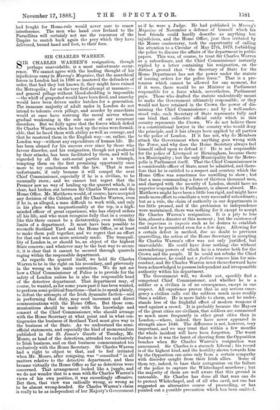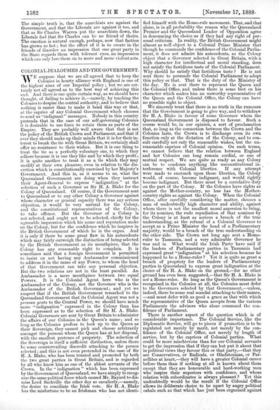SLR CHARLES WARREN.
SIR CHARLES WARREN'S resignation, though perhaps unavoidable, is a most unfortunate occur- rence. We cannot agree with the leading thought of his injudicious essay in Murray's Magazine, that the anarchical forces in London had in 1886 so mastered the defenders of order, that had they but known it, they might have ruined the Metropolis ; for on the very first attempt at massacre— and general pillage without blood-shedding is impossible —the whiff of grapeshot would have been fired, and anarchy would have been driven under hatches for a generation. The immense majority of adult males in London do not intend to tolerate even pillage, and murder by anarchists would at once have restrung the moral nerves whose gradual weakening is the sole cause of our recurrent disorders. But we fully agree that the forces which defied Sir Charles Warren when he took up the reins were formid- able, that he faced them with ability as well as courage, and that he mastered them in the English way—or, rather, the London way—without any expenditure of human life. He has been abused for his success ever since by those who favour disorder, and his resignation, though not produced by their attacks, has been facilitated by them, and will be regarded by all the anti-social parties as a triumph, tempting them on the first promising opportunity once • more to try conclusions with the law. That is most unfortunate, if only because it will compel the next Chief Commissioner, especially if he is a civilian, to be unusually stern ; and we cannot but regret that the Premier saw no way of healing up the quarrel which, it is clear, had broken out between Sir Charles Warren and the Home Office. Mr. Matthews would, of course, have accepted any decision of the Cabinet, and Sir Charles Warren, even if he is, as alleged, a man difficult to work with, and only in his place when unquestionably at the top, is a high- minded officer of great experience, who has obeyed orders all his life, and who must recognise fully that in a country like this there cannot be a dictatorship, even within the limits of a department. It must have been possible to reconcile Scotland Yard and the Home Office, or at least to make them pull together, and we regret that an effort for that end was not more seriously made. The tranquil- lity of London is, or should be, an object of the highest State concern; and whatever may be the best way to secure it, it is clear that it cannot be secured through quarrels raging within the responsible department. As regards the quarrel itself, we hold Sir Charles Warren to be in the right on his secondary, and grievously in the wrong on his main contention. We do not see how a Chief Commissioner of Police is to provide for the safety of London unless he is also the responsible head of the detective department. That department may, of course, be wanted, as for some years past it has been wanted, to perform semi-political functions—that is, to speak plainly, to defeat the attempts of the Irish dynamite faction—and in performing that duty, may need incessant and direct communications with the Home Office. But those com- munications should be made with the knowledge and consent of the Chief-Commissioner, who should arrange with the Home Secretary at what point and in what con- tingencies the business of Scotland Yard must give way to the business of the State. As we understand the semi- official statements, and especially the kind of memorandum published in the St. James's Gazette of Tuesday, Mr. Monro, as head of the detectives, attended too exclusively to Irish business, and on that business communicated too exclusively with the Home Secretary. Sir Charles Warren had a right to object to that, and to feel irritated when Mr. Monro, after resigning, was " consulted " in all matters relative to the detective department, and thus became virtually the Home Office so far as detectives were concerned. That arrangement looked like a juggle, and we do not wonder that to a, man with Sir Charles Warren's views of his own position, it was exceedingly offensive. But then, that view was radically wrong, so wrong as to be almost wrong-headed. Sir Charles Warren's claim is really to be as independent of her Majesty's Government as if he were a Judge. He had published in Murray's Magazine of November a defence of himself which his best friends could hardly describe as anything but injudicious, and the Home Office, just then irritated by the Monro controversy, took the opportunity of calling his attention to a Circular of May 27th, 1879, forbidding the police to discuss the affairs of the department in public papers. This was, of course, to treat Sir Charles Warren as a subordinate, and the Chief Commissioner instantly replied by a letter containing his resignation, on the distinct ground that "the Secretary of State for the Home Department has not the power under the statute of issuing orders for the police force." That is a pre- tension which cannot be allowed for one moment, for if it were, there would be no Minister in Parliament responsible for a force which, nevertheless, Parliament pays. Those who drafted the statute undoubtedly meant to make the Government ultimately responsible, or they would not have retained in the Crown the power of dis- missing the Chief Commissioner ; and by a well-under- stood rule, each Secretary of State represents fully and can bind that collective official entity which in this country represents the Crown. We do not believe there is a constitutional lawyer in the country who would deny the principle, and it has always been applied by all parties to the police of London. If it has not, why do Members attack the Government when anything goes wrong with the Force, and why does the Home Secretary always feel himself called upon to defend it ? He is not responsible for the police of Liverpool or Birmingham, because there is a Municipality ; but the only Municipality for the Metro- polis is Parliament itself. That the Chief Commissioner is a considerable officer of State, must be admitted, and. there- fore that he is entitled to a respect and courtesy which the Home Office was sometimes too unwilling to show ; but that a man commanding a force of thirteen thousand men, and charged with the security of London, should have no superior responsible to Parliament, is almost absurd. Mr. Matthews might have been a little less rigid, and might have made more effort to conciliate a very successful subordinate ; but as a rule, the claim of authority in our departments is too little pressed, and if the pretension to independence were maintained, there was nothing for it except to accept Sir Charles Warren's resignation. It is a pity to lose him, almost a disaster at this moment ; but the existence of the imperil= in imperio such as he desires to establish could not be permitted even for a few days. Allowing for a certain defect in method, due no doubt to previous quarrelling, the action of the Home Secretary in accepting Sir Charles Warren's offer was not only justified, but unavoidable. He could have done nothing else without surrendering powers of which he is a trustee both for the Crown and the people. If he could not rebuke the Chief Commissioner, he could not a fortiori remove him for mis- conduct, and Sir Charles Warren must thenceforward have been acknowledged to possess independent and irresponsible authority within his department.
The Government will, we doubt not, speedily find a competent Chief Commissioner, and whether he is a soldier or a civilian is of no consequence, except in one respect. All experience proves that in any serious emer- gency a civilian calls out the soldiers much more readily than a soldier. He is more liable to alarm, and he under- stands less of the frightful effect of modern weapons if used against a crowd. It is probably because the Mayors of the great cities are civilians, that soldiers are summoned so much more frequently in other great cities than in London,—where, indeed, they have never appeared in strength since 1848. The difference is not, however, very important, and we may trust that within a few months the whole incident will have been forgotten. The worst feature in it was the burst of cheering from the Opposition benches when Sir Charles Warren's resignation was announced. Sir Charles is a staunch Liberal ; his record is of the highest kind, and the hostility shown towards him by the Opposition can arise only from a certain sympathy with disorder caught from their Irish allies. Some of them try, indeed, to base their antagonism on the failure of the police to capture the Whitechapel murderer ; but the majority of them are well aware that this ground is untenable. Sir Charles has done all that man can do to protect Whitechapel, and of all who cavil, not one has suggested an alternative course of proceeding, or has pointed out a possible precaution which has been omitted. The simple truth is, that the anarchists are against the Government, and that the Liberals are against it too, and that as Sir Charles Warren put the anarchists down, the Liberals feel that Sir Charles can be no friend of theirs. The emotion is natural enough, perhaps, now that faction has grown so hot ; but the effect of it is to create in the friends of disorder an impression that one great party in the State regards them with tolerant eyes, an impression which can only lure them on to more and more violent acts.



















































 Previous page
Previous page